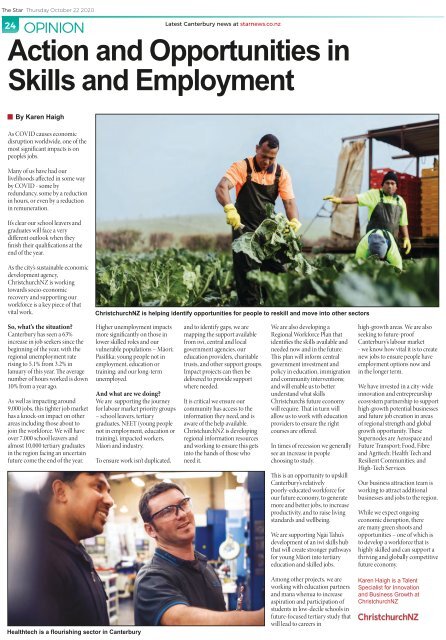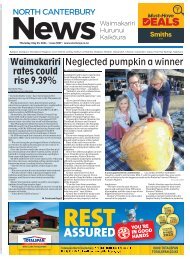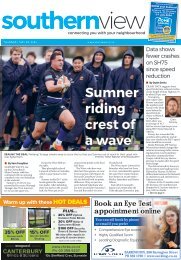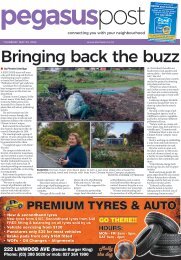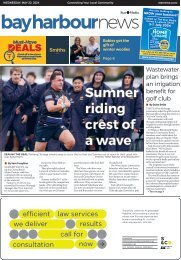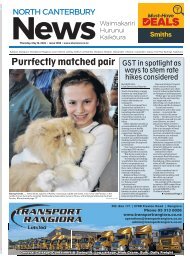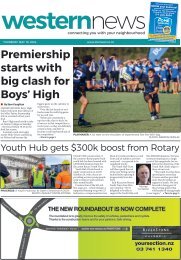The Star: October 22, 2020
You also want an ePaper? Increase the reach of your titles
YUMPU automatically turns print PDFs into web optimized ePapers that Google loves.
<strong>The</strong> <strong>Star</strong> Thursday <strong>October</strong> <strong>22</strong> <strong>2020</strong><br />
24<br />
OPINION<br />
Latest Canterbury news at starnews.co.nz<br />
Action and Opportunities in<br />
Skills and Employment<br />
By Karen Haigh<br />
As COVID causes economic<br />
disruption worldwide, one of the<br />
most significant impacts is on<br />
people’s jobs.<br />
Many of us have had our<br />
livelihoods affected in some way<br />
by COVID - some by<br />
redundancy, some by a reduction<br />
in hours, or even by a reduction<br />
in remuneration.<br />
It’s clear our school leavers and<br />
graduates will face a very<br />
different outlook when they<br />
finish their qualifications at the<br />
end of the year.<br />
As the city’s sustainable economic<br />
development agency,<br />
ChristchurchNZ is working<br />
towards socio-economic<br />
recovery and supporting our<br />
workforce is a key piece of that<br />
vital work.<br />
ChristchurchNZ is helping identify opportunities for people to reskill and move into other sectors<br />
So, what’s the situation?<br />
Canterbury has seen a 63%<br />
increase in job seekers since the<br />
beginning of the year, with the<br />
regional unemployment rate<br />
rising to 5.1% from 3.2% in<br />
January of this year. <strong>The</strong> average<br />
number of hours worked is down<br />
10% from a year ago.<br />
As well as impacting around<br />
9,000 jobs, this tighter job market<br />
has a knock-on impact on other<br />
areas including those about to<br />
join the workforce. We will have<br />
over 7,000 school leavers and<br />
almost 10,000 tertiary graduates<br />
in the region facing an uncertain<br />
future come the end of the year.<br />
Higher unemployment impacts<br />
more significantly on those in<br />
lower skilled roles and our<br />
vulnerable populations – Māori;<br />
Pasifika; young people not in<br />
employment, education or<br />
training; and our long-term<br />
unemployed.<br />
And what are we doing?<br />
We are supporting the journey<br />
for labour market priority groups<br />
– school leavers, tertiary<br />
graduates, NEET (young people<br />
not in employment, education or<br />
training), impacted workers,<br />
Māori and industry.<br />
To ensure work isn’t duplicated,<br />
and to identify gaps, we are<br />
mapping the support available<br />
from iwi, central and local<br />
government agencies, our<br />
education providers, charitable<br />
trusts, and other support groups.<br />
Impact projects can then be<br />
delivered to provide support<br />
where needed.<br />
It is critical we ensure our<br />
community has access to the<br />
information they need, and is<br />
aware of the help available.<br />
ChristchurchNZ is developing<br />
regional information resources<br />
and working to ensure this gets<br />
into the hands of those who<br />
need it.<br />
We are also developing a<br />
Regional Workforce Plan that<br />
identifies the skills available and<br />
needed now and in the future.<br />
This plan will inform central<br />
government investment and<br />
policy in education, immigration<br />
and community interventions;<br />
and will enable us to better<br />
understand what skills<br />
Christchurch’s future economy<br />
will require. That in turn will<br />
allow us to work with education<br />
providers to ensure the right<br />
courses are offered.<br />
In times of recession we generally<br />
see an increase in people<br />
choosing to study.<br />
This is an opportunity to upskill<br />
Canterbury’s relatively<br />
poorly-educated workforce for<br />
our future economy, to generate<br />
more and better jobs, to increase<br />
productivity, and to raise living<br />
standards and wellbeing.<br />
We are supporting Ngāi Tahu’s<br />
development of an iwi skills hub<br />
that will create stronger pathways<br />
for young Māori into tertiary<br />
education and skilled jobs.<br />
high-growth areas. We are also<br />
seeking to future-proof<br />
Canterbury’s labour market<br />
- we know how vital it is to create<br />
new jobs to ensure people have<br />
employment options now and<br />
in the longer term.<br />
We have invested in a city-wide<br />
innovation and entrepreurship<br />
ecosystem partnership to support<br />
high-growth potential businesses<br />
and future job creation in areas<br />
of regional strength and global<br />
growth opportunity. <strong>The</strong>se<br />
Supernodes are Aerospace and<br />
Future Transport; Food, Fibre<br />
and Agritech; Health Tech and<br />
Resilient Communities; and<br />
High-Tech Services.<br />
Our business attraction team is<br />
working to attract additional<br />
businesses and jobs to the region.<br />
While we expect ongoing<br />
economic disruption, there<br />
are many green shoots and<br />
opportunities – one of which is<br />
to develop a workforce that is<br />
highly skilled and can support a<br />
thriving and globally competitive<br />
future economy.<br />
Healthtech is a flourishing sector in Canterbury<br />
Among other projects, we are<br />
working with education partners<br />
and mana whenua to increase<br />
aspiration and participation of<br />
students in low-decile schools in<br />
future-focused tertiary study that<br />
will lead to careers in<br />
Karen Haigh is a Talent<br />
Specialist for Innovation<br />
and Business Growth at<br />
ChristchurchNZ


